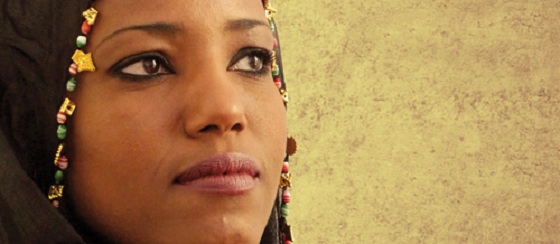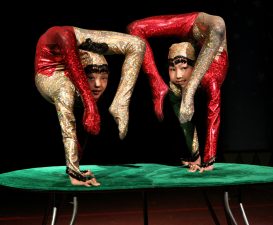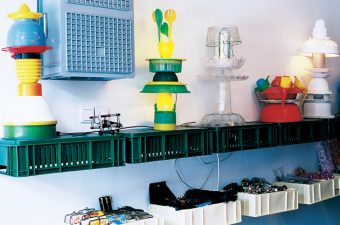 Toni Polo, founder of Radio Groovalizacion explains how music and migration are shaping contemporary culture in the Middle East and North Arfica.
Toni Polo, founder of Radio Groovalizacion explains how music and migration are shaping contemporary culture in the Middle East and North Arfica.
As an avid “world music” listener – although I don’t like this term but I still haven’t found a better one- it is always an immense pleasure to discover hidden musical gems. One organization that feeds you with just these jewels is radio Groovalizacion. Greenprophet interviews founder Toni Polo to find out why and how radio Groovalization and its music is a successful medium through which people from the Middle East and North Africa can express, communicate and continue traditions.
Convinced that art and culture can raise social awareness, Ton Polo has been coordinating various intercultural schemes since 2006, either as a film director, radio journalist, DJ or cultural manager of his project “Migratory Music ”. He has been involved in various activities in relation with music, immigration, identities and integration collaborating with several NGOs and associations in Argentina, Spain, Senegal, Morocco, Turkey, Portugal and Mali.
Emigration from the Middle East and North Africa (MENA) to Europe has been an important political and economic topic in the past ten to fifteen years- in 2010 the stock of documented migrants was 18.1 million or 5.3% of the MENA region population. However little is discussed on the cultural, traditional and artistic impact migration is having on the country of origin and departure.
In terms of music, what does emigration mean for the MENA region, particularly the Maghreb countries such as Morocco, Libya, Algeria, and Tunisia – where many young people are leaving their homeland and perhaps foregoing their own traditional lifestyles, practices and rituals for more “westernized” ones?
Music is always an interesting way to analyze what is going on in terms of politics, demography or economics. Nowadays with the Internet; migration, exchange and the influence across the Mediterranean are stronger than ever. The way young people in these countries consume have changed rapidly in the last 30 years and consequently so have the artistic and cultural tendencies. In these transformative processes there is always an initial period of imitation, in which artists tend to copy what is seen or heard from the TV, radio, press and internet. However, interestingly, there is a second period where artists and musicians try to recuperate and rediscover their own roots.
I believe in the last ten years, there has been a new generation of artists in many of the MENA countries who are more conscious of their origins and try to build on their local musical roots by blending in global influences such as Hip-Hop, Jazz, Reggae, Funk. Typically these are the artist who migrated or lived abroad, while those that have not migrated tend to copy western musıc because they appreciate their own wealth less.
At the same time, the concept of emigration in the MENA has been changing in the past 5 years. In 2007, when I was shooting a documentary “The colors of Tea” about young musicians in Morocco such as Darga, Zazz Band, Style Souss, Amarg Fusion or Ganga Vibes, many of the musicians we met told to us they didn’t want to leave theır country, instead they want to fight against the problems that exist in their own country such as corruption, Woman’s Rights and democracy. I think this feeling of pride and responsibility has increased with the crisis as we can see from the “Arab Spring”, this also means that many of the themes of the songs are also changing.
How does radio groovalizacion “give a voice” to different cultures and social issues across the MENA region specifically?
I founded Groovalizacion with a French friend who has origins from Morocco, since the beginning we gave special attention to artists in this region because we wanted to provide Europeans with a contemporary vision of the MENA while demystifying stereotypes. Since then we broadcast regularly albums and artist from this region such as Dhafer Youssef from Tunisia, Darga from Morocco, Aziza Brahim from Sahraoui (Western Sahara) or Ibrahim Maalouf from Lebanon.

Aziza Brahim has transformed some poems of Ljarda Mint Mabroc, a poet known amongst the Sahraouis, into music. They all evoke the struggle for independence of the Sahraoui people, the difficulty of living in exile and the heroic deaths at the Polisario Front.
Personally, I have made some research on the MENA region as part of my project “Migratory Music”, with “The colors of tea” and another project in 2010 and 2011 called “Bosphoroads” about the blend between tradition and modernity in contemporary Turkish music. But also in one of my latest projects about music from Valencia called “Mediterraquis” . I like to speak about the connections between music from several parts of the Mediterranean sea to show that in all these regıons from Spain to Syria, or from Greece to Algeria, are more connected than we think in cultural terms.
With this in mind, one of the main ideas of Groovalzaicon is to create a global platform which focuses on music in terms of content but also in terms of the creators, the people. This way we are not only “giving a voice” to social and political issues but also we are “giving a voice” to specific people and populations. We are now trying to expand to include journalist, musicians, visual artists or filmmakers from these countries in order to include a wider variety of creativity from this area.
In your experience, are the themes that migrant musicians cover in their songs different from those that non-migrants cover in the same region?
For me is hard to speak about the lyrics and the themes of this music because many times the songs are in Arabic or other local languages. But I think that in general, between the artists who live abroad it’s more common to find lyrics about the local government or the political situation because in many MENA countries there is still a strong censorship. Even in a country that we consider democratic such as Turkey, I remember an interview with the band Babazula where they spoke about the strong censorship suffered by Turkish musicians nowadays. I think the voice and the work of these migrant artists have been pivotal in changing the mentality of the local people, who start to become more conscientious about the responsibilities of their own governments.
In recent years, how much “voice” are marginalized or “minority” groups such as the Tuareg, Berbers, Bedouins and Druze gaining through music? Is radio groovalizacion providing a platform for them?
For Groovalizacion it is very important to give a voice to minorities all over the world because we really believe that the power and the health of a society depend of the diversity and tolerance it has. Personally I have developed several projects trying to reinforce the cultural diversity in some of these countries. For example, in Mali I started a radio-show called “Mundo Mali” in partnership with a communitarian radio called Radio Kayira , and a video-series called Bamakosmos. In both I interview many of the ethnic groups that are present in Mali, some of them with deep problems of integration and tolerance, like the Tuaregs. And as we are seeing now with the current situation in Northern Mali, tolerance, integration and respect has to be supported by the politicians because if not fights, radicalism and conflict could appear everywhere, in Mali, Syria or France. Music plays an important role in diffusing messages of tolerance and unity. Radio Groovalizacion has provided a platform of podcasts, articles, live events and more for many “minority” artists especially from Western Sahara.
If you had to describe radio groovalizacion with 1 adjective, 1 verb, 1 noun and 1 goal what would they be?
Nomad, travel, journey, share sounds to connect people.



